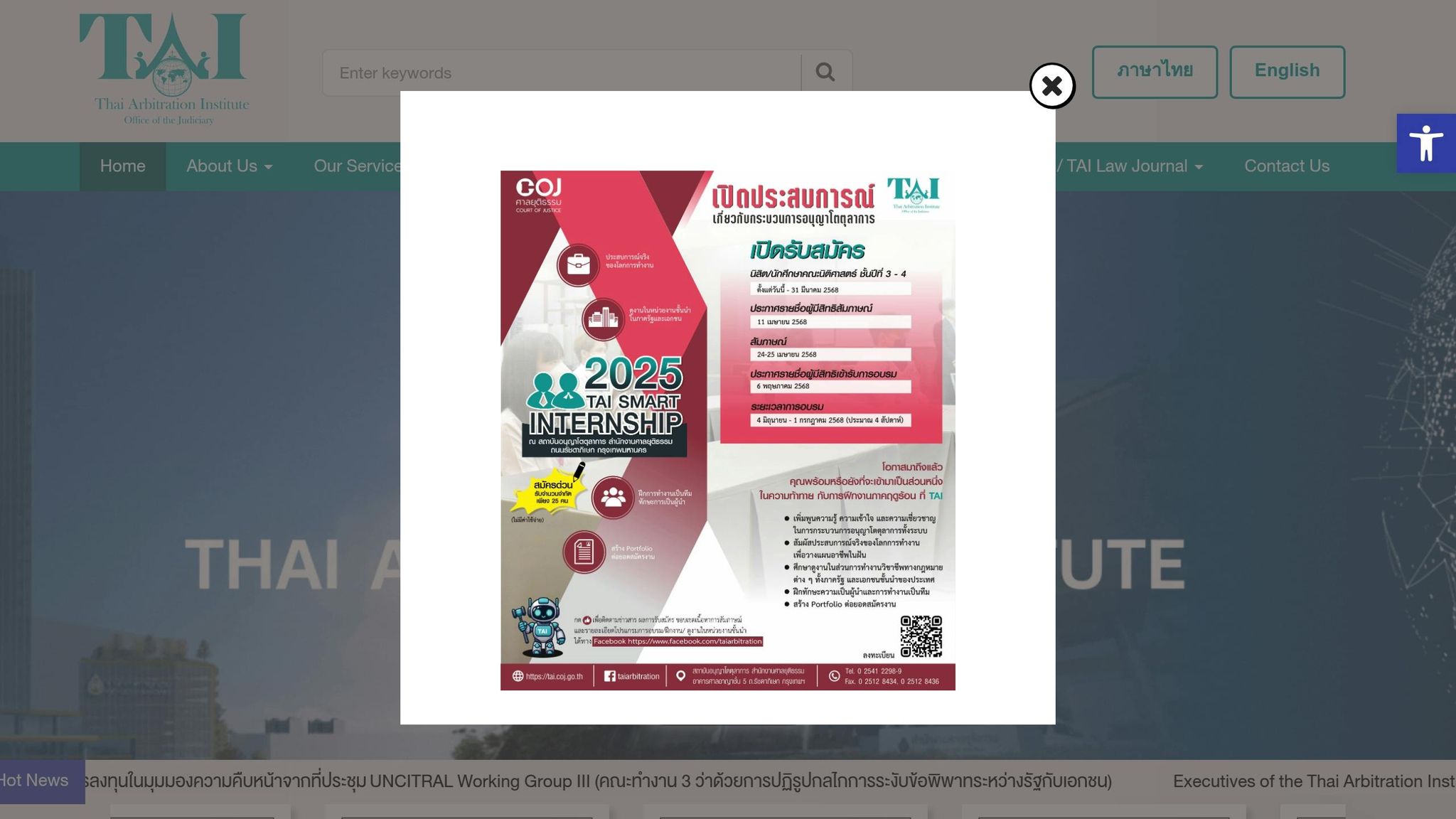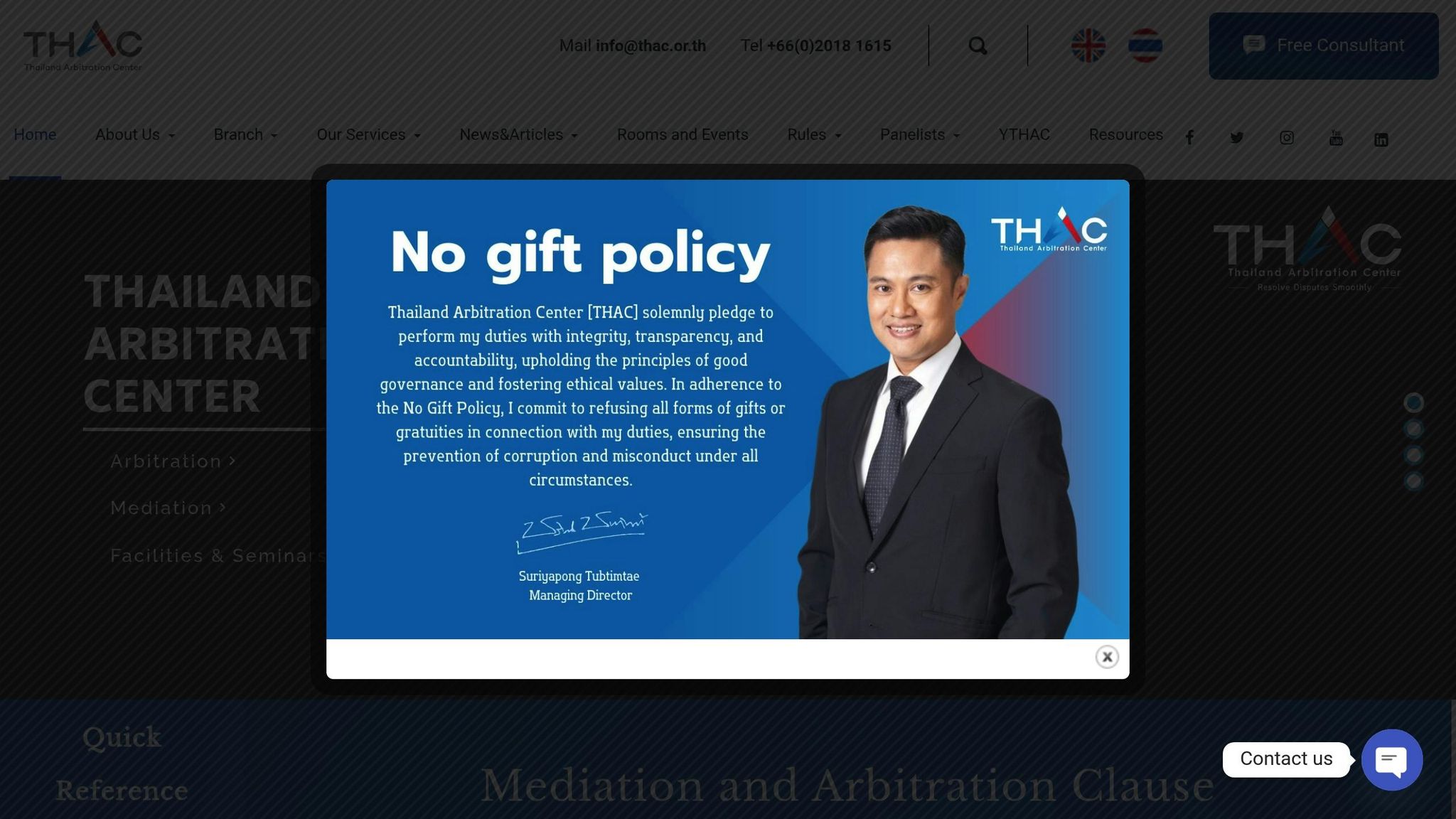
International Arbitration in Thailand: Overview
International arbitration in Thailand provides a neutral and efficient way to resolve cross-border disputes. It avoids the complexities of local court systems and ensures enforceable decisions. Here’s a quick summary:
- Legal Framework: Governed by the Arbitration Act B.E. 2545 (2002) and aligned with global standards like the New York Convention.
-
Key Features:
- Written arbitration agreements are mandatory.
- Parties can select arbitrators based on agreed qualifications.
- Thai courts support interim measures and enforce foreign awards unless they violate public policy.
-
Arbitration Centers:
- Thai Arbitration Institute (TAI): Focuses on local disputes.
- Thailand Arbitration Center (THAC): Handles international cases.
-
Process:
- Starts with a Notice of Arbitration.
- Includes written submissions, hearings, and a final award.
- Challenges: Awards can be canceled for procedural issues, jurisdictional errors, or public policy conflicts.
- Support for Expats: Services like Pegleg offer legal help with clear pricing and expert advice.
Thailand’s arbitration system combines global practices with local legal traditions, making it a reliable option for resolving disputes.
THAC 2024: The Impact of the Local Court’s Facilitation on ...
Thai Arbitration Laws and Standards
Thailand's arbitration system is designed to serve both local and international parties by offering efficient procedures that align with global practices while respecting local legal traditions. Here's a closer look at the key legislation shaping arbitration in Thailand.
Arbitration Act B.E. 2545 (2002)
This Act outlines the framework for arbitration in Thailand, covering essential aspects like:
- Arbitration Agreement: Agreements must be in writing and explicitly state the parties' intent to resolve disputes through arbitration.
- Arbitrator Selection: Parties have the flexibility to select arbitrators based on mutually agreed qualifications.
- Interim Measures: Courts can issue temporary protection orders during arbitration proceedings.
- Award Recognition and Enforcement: The Act specifies clear procedures for recognizing and enforcing arbitration awards.
The Act provides parties with significant control over arbitration procedures while ensuring fairness and adherence to due process.
Foreign Award Enforcement
Thailand's commitment to international arbitration is evident in its adherence to the New York Convention on the Recognition and Enforcement of Foreign Arbitral Awards. This ensures that:
- Foreign arbitration awards from member states are generally enforceable in Thai courts.
- A petition for enforcement must be filed within three years of the award's finalization.
- Thai courts recognize foreign awards unless they conflict with public policy or procedural fairness.
The enforcement process typically spans 12–18 months, depending on case complexity and challenges. Thai courts require certified translations of all documents, including the award and supporting evidence.
To enforce a foreign award, the following are required:
- The original award or a certified copy
- The original arbitration agreement or a certified copy
- Certified Thai translations of all documents
- Proof that the award is final and binding
- Evidence confirming all parties received proper notice
Thai courts are generally supportive of enforcing foreign awards, reinforcing Thailand's role as a key player in international arbitration and a regional business center.
Next, we’ll explore the major arbitration centers in Thailand.
Main Arbitration Centers in Thailand
Thailand is home to two key arbitration centers that address both domestic and international disputes.
Thai Arbitration Institute (TAI)

The TAI specializes in resolving local commercial and governmental disputes. It operates with a strong understanding of Thai legal frameworks, making it a go-to option for cases rooted in local regulations.
Thailand Arbitration Center (THAC)

The THAC is geared toward international commercial arbitration. It employs modern methods to handle cross-border disputes efficiently, catering to the needs of global businesses.
These centers provide solutions tailored to both local and international dispute resolution. Up next, learn how arbitration cases are initiated and managed.
Starting and Running Arbitration Cases
This section provides a practical guide to initiating and managing arbitration cases, following the overview of arbitration centers.
Drafting Arbitration Agreements
A well-drafted arbitration agreement is crucial. Be sure to include:
- The specific disputes the agreement will cover
- Selection of the arbitration institution (e.g., TAI or THAC)
- Number of arbitrators and how they’ll be chosen
- Governing law and procedural rules
- Language for proceedings
- The arbitration seat
Having an expert review the agreement can help avoid issues later.
Selecting Arbitrators
Choosing the right arbitrator is key to a fair process. Look for:
- Expertise relevant to the dispute
- Independence and impartiality
- Availability to commit to the case
- Proficiency in the required language
- Familiarity with cultural nuances related to the case
Steps in the Arbitration Process
Arbitration follows a structured timeline, ensuring clarity and order:
1. Notice of Arbitration
The claimant kicks off the process by submitting a notice that includes:
- Details about the parties involved
- A description of the dispute
- The relief being sought
- A proposed arbitrator nomination
2. Response and Counter-Claims
The respondent has 30 days to file their response, which may include counter-claims and, if applicable, their choice of arbitrator.
3. Preliminary Meeting
The tribunal sets the groundwork by establishing:
- A timeline for the proceedings
- Deadlines for submitting documents
- Hearing dates
- How evidence will be presented
4. Written Submissions
Both sides provide:
- Statements of claim and defense
- Supporting documents
- Witness statements
- Expert reports
5. Hearings
Hearings, typically lasting 3–5 days, include:
- Presentations of the cases
- Witness testimonies
- Expert findings
- Questions from the tribunal
6. Award
The tribunal delivers its decision based on the agreed arbitration rules, often within 30 days of the final hearing.
"Pegleg ensures transparent and affordable pricing with no hidden fees"
These steps are designed to align with Thailand’s legal framework, offering a consistent and efficient approach to resolving disputes.
sbb-itb-0bdbfe0
Key Points for Foreign Parties
Choosing Language and Jurisdiction
Foreign parties need to decide on the language and jurisdiction for arbitration. While Thai is often the default, parties can agree to use English if it better aligns with their needs. Picking the right jurisdiction involves considering the governing law, the arbitration seat, and how enforceable the award will be. These choices are critical for managing costs and selecting the most suitable decision-maker.
Time and Cost Considerations
After deciding on language and jurisdiction, it's essential to assess the time and financial commitments required. Arbitration in Thailand can be a lengthy and costly process, with expenses varying depending on the case. Costs typically include administrative fees, arbitrator compensation, and legal representation.
"Pegleg ensures transparent and affordable pricing with no hidden fees"
Selecting the Right Arbitrator
When choosing an arbitrator, foreign parties should focus on candidates with strong experience in international disputes and a thorough understanding of Thai arbitration law. This combination of skills helps navigate cross-border challenges while ensuring compliance with local legal standards.
Award Enforcement and Legal Challenges
Even with strong enforcement systems in place, arbitration disputes can still encounter legal hurdles.
Recognition of Awards
Thailand generally recognizes foreign arbitration awards under international frameworks like the New York Convention. Thai courts ensure these awards are final and adhere to procedural requirements. However, the strict standards applied by the courts can also allow for cancellations in specific situations.
Common Grounds for Award Cancellation
Thai courts may deny enforcement or cancel arbitration awards based on several typical reasons:
| Grounds for Award Cancellation | Description |
|---|---|
| Procedural Irregularities | Examples include inadequate notice or insufficient chances to present a case |
| Jurisdictional Issues | When an award addresses matters outside the agreed scope of arbitration |
| Public Policy Violations | Awards that conflict with Thai public policy or moral principles |
| Arbitrator Misconduct | Evidence of bias, corruption, or undisclosed conflicts of interest |
| Invalid Agreement | Concerns about whether the arbitration agreement was properly executed and legally binding |
These reasons highlight the detailed review process Thai courts apply to arbitration cases.
Thai Courts' Role in Arbitration
Thai courts actively support arbitration, especially in international disputes. Specialized courts, such as the Central Intellectual Property and International Trade Court (IP&IT Court), address complex arbitration issues. They ensure all documentation is complete, and consulting local experts is highly recommended. This structured approach reflects Thailand's dedication to fostering a balanced and reliable arbitration enforcement system.
Pegleg Legal Services for Arbitration

Expats dealing with arbitration challenges in Thailand can benefit from specialized legal support. Pegleg's services aim to address the risks and delays often encountered during arbitration proceedings.
Transparent Pricing and Professional Support
Pegleg connects expats with licensed, pre-vetted lawyers experienced in international business and arbitration in Thailand. Their clear pricing model ensures no hidden fees, making legal support both accessible and predictable. The service prioritizes quick responses and practical solutions, with experts ready to tackle issues efficiently.
Arbitration Support Options
| Service | Description | Benefits |
|---|---|---|
| Agreement Review | Examination of arbitration clauses and agreements | Ensures compliance with Thai law |
| Document Preparation | Help with drafting arbitration documentation | Meets Thai arbitration standards |
| Legal Consultation | Access to skilled arbitration lawyers | Offers strategic advice and risk evaluation |
| Contract Analysis | Review of contracts with arbitration terms | Identifies potential issues early |
Flexible Legal Service Plans
Pegleg provides flexibility through an affordable subscription plan - offering a 35% discount - or one-time services. Both options give expats access to lawyers familiar with Thailand's arbitration rules and processes.
The service is designed for ease and reliability, with fast response times that help expats navigate arbitration smoothly while staying compliant with Thai legal standards.
"Pegleg ensures transparent and affordable pricing with no hidden fees"
Summary
Thailand offers a structured system for handling cross-border disputes through its international arbitration framework. This system is backed by modern laws and established institutions, blending global standards with specific local legal requirements. Navigating this system often requires expert advice.
For expats involved in arbitration in Thailand, it's essential to grasp critical elements such as jurisdiction, language requirements, and enforcement procedures. The Thai Arbitration Act B.E. 2545 (2002) aligns with global norms but includes unique local provisions that require careful consideration.
Key factors for managing arbitration effectively include:
- Drafting clear arbitration agreements that meet Thai legal standards
- Choosing arbitrators with expertise in both global and local practices
- Paying close attention to procedural rules and deadlines
- Understanding enforcement processes and potential obstacles
Specialized legal assistance is often necessary to handle these aspects efficiently. Pegleg connects expats with licensed Thai lawyers who are well-versed in both international and local arbitration systems. Their subscription plans, offering a 35% discount, make professional legal help more accessible.
To date, professional legal services have supported over 1,500 expats, helping them navigate the complexities of arbitration in Thailand while ensuring compliance.
Success in Thailand's arbitration process hinges on accurate documentation, strategic planning, and expert legal guidance.
